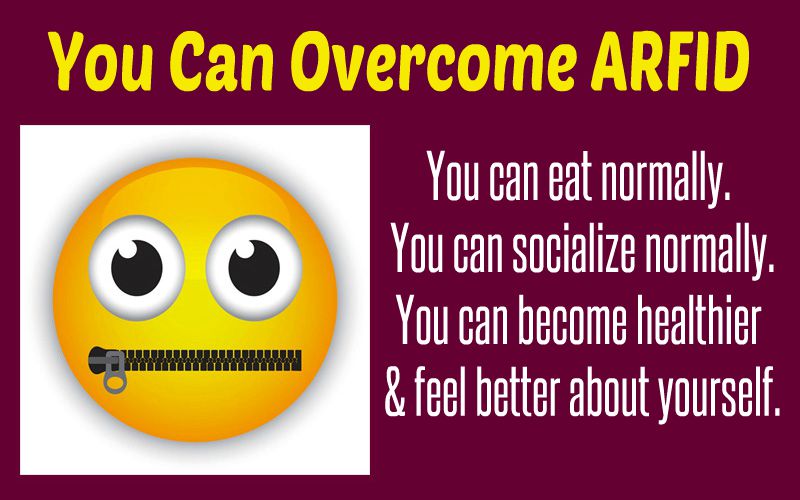Food anxiety can take many forms and entail a variety of expressions, both physical and psychological. Anxiousness is never a good feeling and is proven to be extremely detrimental to overall health and wellness, especially when the condition is recurrent or chronic. Since eating is a daily activity for life, people who suffer anxiety over food often develop other related problems.
What is anxiety? Why would a person suffer from it when being exposed to certain foods? Do anxious feelings denote an eating disorder, such as avoidant restrictive food intake disorder (ARFID)? These are all very important questions to address when considering the origins, impact and treatment for food-related anxiety.
As a person who suffered from ARFID for most of my life, I certainly understand the anxiousness you suffer in relation to eating and food choices. In this post, I will provide scientific facts about food anxiety, as well as call upon my own experience dealing with anxiousness for almost 40 years in relation to food.
What is Food Anxiety?
Anxiety is not a singular and easily definable condition. This is because it affects people very differently and can express itself psychoemotionally, behaviorally, physically and socially. The only thing that is universal about all cases of anxiety is that they are unhealthy and extremely uncomfortable to cope with, especially over long timelines.
Simplified, food anxiety involves feelings of dis-ease, nervousness and discomfort in the mind and body in relation to specific foods or the overall idea of food. People can suffer anxiety for many different reasons and some of these reasons might be related to an eating disorder, such as ARFID. For the remainder of this post, I will focus on anxiety that is experienced in relation to avoidant restrictive food intake disorder, formerly known as selective eating disorder.
Rather than focusing on the abstract theory of anxiety, lets move forward and actually explore its many expressions and the consequences these symptoms can enact in the lives of affected people…

Anxiety Over Food Expressions
As noted above, anxiety over food and eating can cause effects on mind, body, personal behavior and socialization:
Physically, anxiety over food can cause nausea, gag reflex, vomiting, upset stomach, bloating, reflux, diarrhea, profuse sweating, bodily pains, panic attacks, high blood pressure and even contribute to seizures and blackouts in people who are prone to these conditions.
Psychologically, food anxiety can cause chronic feelings of dis-ease, discomfort, emotional upheaval, low self-esteem, poor self-image, poor body-image, hopelessness, isolation and even clinical depression.
Behaviorally, anxiousness over foods can create, contribute to, worsen or perpetuate a diversity of sufferings. Chronic or recurring anxiety attacks related to food can make people eat less quantity, eat less frequently, eat less diversity of food items or avoid eating all together.
Socially, most people with food anxieties tend to avoid communal eating settings, such as gatherings with friends and family. Affected anxious people also tend to avoid restaurant dining in favor of preparing their own food. Common consequences are closely related to the psychology of ARFID and include social isolation, feelings of loneliness, feelings of being different than others and sometimes, complete avoidance of social interactions with others.
Food Anxiety Experiences
I never considered myself anxious for most of the time I suffered from ARFID. This is because, in my case, the anxiety about food and many other things in life, were greatly repressed by my subconscious mind. In essence, I had little recognition of the turmoil of emotional activity boiling below the conscious surface. This repression caused many problems in my life, including developing chronic pain and a host of dysfunctional behavior patterns which I later had to rectify in order to find peace…
I knew that I hated and feared food when suffering from ARFID. However, I never really realized how much these conscious feelings were just the tip of the massive iceberg that remained unconscious. I definitely suffered psychological and behavioral effects from my anxiety, but believe that I suffered social effects the worst. I really dreaded any type of social eating, since I knew it would be that same old conversation again and again why I could not eat what everyone else was clearly enjoying…
My life experience has taught me that investigating the degree and causes of anxiety a person is suffering in relation to peculiar eating habits is very valuable. It is useful towards helping you to cope with or cure your eating issues and is a major part of regaining the optimal path towards true mindbody health and wellness. Repression and suppression are extremely counterproductive defense mechanisms and the sooner you can stop them, the better off you will be in all facets of life.
If you are fortunate enough to consciously realize the extent of your food anxiety beyond mere inklings of discomfort that most people have, then you are already ahead of the curve. You are that much closer to managing your food issues, if and when you decide that you truly want to change. If you do not want to change, then the mere recognition of your anxiety will still prove valuable to your physical health, as well as your future peace of mind.

Leave a Reply
You must be logged in to post a comment.